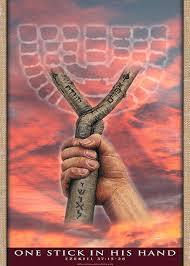Deuteronomy 27:15–18, The commandments are all inter-connected. To the casual reader, the admonitions contained in these verses may seem to be arranged in a random order, but this is not the case.
Consider the following: The prohibition against idolatry (verse 15) is juxtaposed with that of degrading one’s parents (i.e., not honoring one’s parents, or as S. R. Hirsch states in his commentary, “who outwardly is respectful to his parents but inwardly considers himself vastly superior to them”) along with trespassing against one’s neighbor’s property by removing his neighbor’s boundary markers or landmarks.
Now consider this: One who does not honor and fear YHVH but turns to idolatry (the second commandments) will not honor one’s parents (the fifth commandment) (and vice versa) will likewise not honor the property of one’s neighbor (including his neighbor’s wife). Juxtaposed next to these commands is the prohibition against misleading a blind person (verse 18). This means that we should not take advantage of his blindness by advising him in a way beneficial to us and detrimental to him.
Juxtaposed to that is one who steals justice from another by perverting judgment against one who is weaker socially or financially or who is less informed at law than another thereby giving the advantage to the stronger (The ArtScroll Davis Edition Baal HaTurim Chumash/Devarim, pp. 2126–2127).
Can you see how each command is interrelated with all the others? Does this not give one insight into the curious statement found in James 2:10, which declares that if you have broken one commandment you have broken them all? We can see that in one way or the other, all of YHVH’s commandments are inter-related, all depend on each other, and they all stand or fall together.
Now relate James 2:10 back to verse eight where the entire Torah-law can be summarized as the “royal law of love.” As you review YHVH’s list of prohibitions in Deuteronomy 27 can you see any other relationships between these juxtaposed concepts? Learning to exegete (draw truth out of) Scripture in this manner will yield a whole new level of spiritual revelation to the reader.






